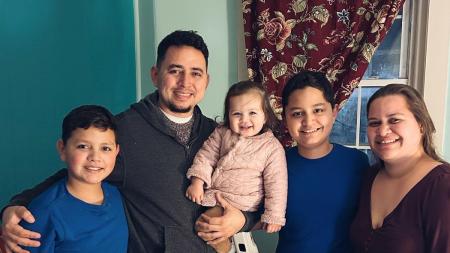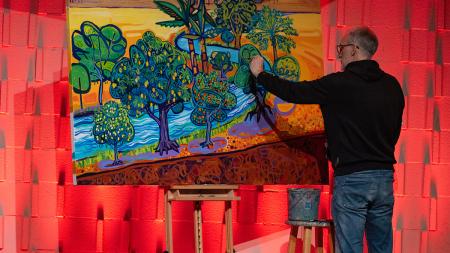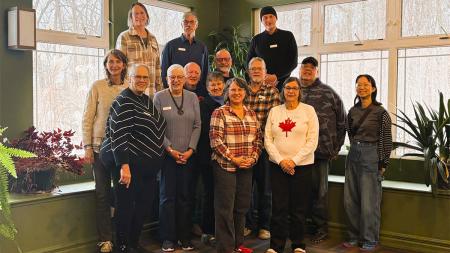A Navajo CRC Leader's Walk of Faith

Ernest Phillip Benally has walked the way of Christianity for many years as a member of the Christian Reformed Church.
The walk has not always been easy, but the Navajo man and retired social worker has been committed to Christ, never letting frustration push him out of the church he loves.
“I became connected with the Christian Reformed Church when I was enrolled at the Crownpoint BIA (Bureau of Indian Affairs) Boarding School,” he writes in a new book, My Walk of Faith.
The son of traditional Navajo parents, Benally turned to Christianity at an early age, particularly because he loved the Bible stories, prayers, and gospel songs he learned while attending religious instruction at the school.
“At age fifteen, I signed up to study catechism, and my motivation behind this was to own a Bible.”
When he became sick and fell behind, a CRC missionary offered to instruct him personally. Benally also was able to accompany the missionary’s Native Christian workers on their summer “camp work” tours with the Gospel message to the hogans, the traditional Navajo dwellings. He enjoyed visiting his people in their homes, he writes, and sharing Bible stories.
“At age seventeen, I made my formal confession of faith, and it was from this period that I wanted to get into the gospel ministry someday.”
Rev. Al Mulder, who currently works with CRC Home Missions, knew Benally when Mulder served as pastor of Bethany CRC in Gallup, New Mexico.
They have been long-time friends, and Mulder asked if he could help Benally write his biography. Copies of the book are available by contacting Mulder at [email protected].
Very few Navajos have written their life stories and so, says Mulder, he was honored when Benally agreed to the project.
“I believe it is close to the way he would have written it,” says Mulder.
The book is a straightforward and honest account of Benally’s life, touching on the native ways of his parents and his grandparents before them and how those practices played into his life — and his uncertainty.
His father had considered being a medicine man, but decided against it after falling into a trance and having a vision that deterred him.
But the religious tradition was strong in the family.
His mother’s father was a medicine man, and his mother’s grandfather was a medicine man before him. Two of his mother’s uncles had also become medicine men. This influence was strong and he at one time considered being a medicine man.
While he veered away from this, he did have a tug toward the spiritual and to Christianity, at least what he knew of it.
“For me to become a Christian was reaching out to the unknown,” he writes. “The best way to explain it is to say that it’s like being thrown out with your bathwater.
“Accepting and being led to accept the Christian way was fearful because the missionary (working with him) didn’t tell me exactly what to believe as they just told me the stories.”
Making it especially hard to accept, he says, was being told he was “a sinner and must believe in Jesus Christ because he died for your sins is too much to grasp, especially when there is no such concept in your own religion.”
In his book, Benally traces the many disappointments he experienced as he tried to become a CRC pastor — the various roadblocks he encountered along the way.
He attended CRC colleges and in some cases thrived, but wasn’t as successful in others. He worked with many missionaries — and, again, some of them were kind and encouraging, but others caused him much frustration.
Of one situation, he writes: “I hate to admit it, but I got fed up with him. I think he was fed up with me, too, because I spoke up and wasn’t subservient. He wouldn’t talk to me for a whole week. I finally told him, ‘You are disappointed with me ; I am disappointed with you too.”
Although he was never ordained to be a minister, Benally worked on many Native American mission fields as a missionary helper and assistant missionary. Later he entered deeply into the lives of native people as an on-site social worker.
He received his MSW from the University of Utah.
He also served as a mental health specialist, helped the BIA negotiate property settlements, and ended his career in social work as director of medical social work at the Indian Health Service hospital in Crownpoint.
In addition, after retiring from social work, Benally was Home Missions regional leader for Classis Red Mesa from 1996 to 1999.
In his book, Benally writes about his first marriage with Martha, a woman whom he loved very much and who died of cancer, plunging him into a depression.
But he also writes of the hope that has come with a second marriage.
“I met Ruth when she was serving as head teacher at Crownpoint in 1997. As ministry director for Red Mesa, I had occasion to talk with her about a proposed association of Red Mesa Christian schools. Ruth was somewhat doubtful about joining the association, but the conversation soon turned to more personal topics.”
Despite a rocky road as a member of the CRC, and the disappointing reality that he was never able to formally answer his call to ordained ministry, Benally has remained steadfast in his support of the CRC, says Mulder. He is a Native American leader who has stayed.
“I think he wants people to understand he is as thoroughly CRC as anyone,” says Mulder. “Despite its flaws he totally loves and respects and affirms the denomination. He never left it. It has always been his church.”
Writer James Schaap wrote a review of Benally’s book that is available by viewing Schaap’s Sept. 12 post on his “Stuff in the Attic” blog.


